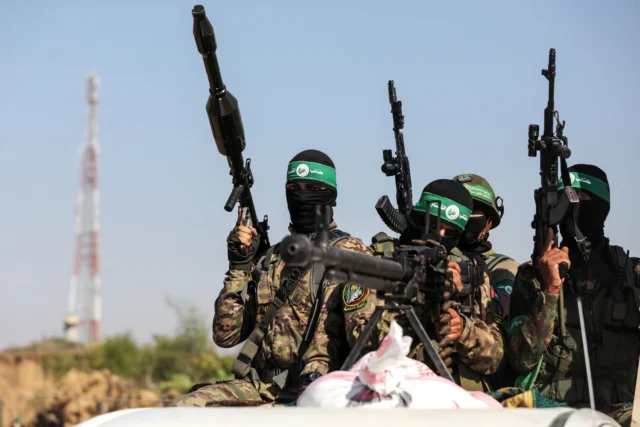After President Joe Biden’s Thursday press conference, most people appeared to have fixated on the gaffes. Okay, that is fun. But the president appeared to know exactly (or mostly) what he wanted to say about the Middle East; he didn’t stumble and he could be heard clearly. And that is the problem — to the extent that he was speaking the truth, or the truth he has gleaned from the State Department and left-leaning members of Congress: Israel is in serious trouble with America’s Middle East policy.
Biden never mentioned October 7 as a Hamas invasion of Israel resulting in the largest mass murder and mutilation of Jews since the Holocaust. He did not mention Hamas at all as a terror organization. He did not mention the hostages held by Hamas in defiance of international humanitarian law — or mention that six Americans are being held.
(Say their names, Mr. President.)
His first priority, he said, was aid for Palestinian civilians in Gaza. He went to Israel, he said, right after “the massacres that occurred at the hands of Hamas,” but stressed his mission was to convince Prime Minister Benjamin Netanyahu to allow aid into Gaza. “I met with most of the Arab leaders to try and get a consensus going as to what had to be done to get more aid and food and medicine into the Gaza Strip. We pushed really hard. Israel occasionally was less than cooperative.”
Israel’s war cabinet, he said, was the most right-wing Israeli government he had ever dealt with and went off on a ramble about sitting with Golda Meir and Yitzhak Rabin decades ago.
The president “regretted” the failure of the “Gaza pier,” the $329 million U.S.-taxpayer funded debacle (plus at least $40 million in repairs). He did not mention that there never was a famine in Gaza and that even the UN recanted. He did not mention the holdup of aid first was because Egypt would not open the gates from Sinai and presently because the UN and the “international community” cannot seem to put the aid on its trucks and distribute it.
The third point was that there would be no Israeli occupation in Gaza and that Israel should take America’s war in Afghanistan as a warning. “We made that mistake in Afghanistan,” he said, noting that he had seen that country from “the poppy fields to the north (first he said, ‘every inch,’ but never mind.) I told Israel: ‘Don’t think that’s what you should do. Don’t double down on our mistake.’” He did not note that “our mistake” took place in someone else’s country 6,000 miles from the U.S. homeland, while Israel’s war is taking place inside the country and alongside its people. He did not mention the Iranian-supported Hezbollah rocket-missile war that has forced 60,000 to 80,000 Israelis to leave their homes and is making a wasteland of Israel’s north.
Iran supports both Hamas and Hezbollah with weapons, funds and political support in their wars, and supports the Houthi terrorists in the Red Sea that have been firing on U.S. and other shipping. He did not mention Iran at all.
Lest you think he didn’t care about Israel, he noted, “I was able to unite the Arab nations as well as Europe” when Iran fired missiles into Israel in April.
But for Israel’s defense, “It’s time to end this war. It doesn’t mean walk away from going after [Hamas leader Yahya] Sinwar and Hamas.” Actually, it means precisely that – allowing Sinwar and his minions to emerge from the rubble and proclaim victory from the wreckage. Should Israel then, say, assassinate Sinwar, what would the U.S. do? And how does he propose that Israel contain Hamas without destroying its military capability – which Israel has pledged to do?
At the same time, he said, “I will not supply 2000lb bombs. They cannot be used in any populated area without causing great human tragedy and damage.” He is right on that one, of course, which is precisely why Hamas put its tunnels and operational headquarters under civilian infrastructure including homes, schools, hospitals and mosques. Again, no condemnation of Hamas for its war crimes against its own people. No mention of UNRWA or other UN support of Hamas.
He wants a cease fire. There is a chance for a “two-state solution,” and there is “growing dissatisfaction with Hamas on the West Bank” (?).
But, in the end, he has regrets. “There are lots of things in retrospect I wish I had been able to convince the Israelis to do.” Lots of people wish you had been able to convince Hamas to surrender and give up the hostages, Mr. President.
He closed with, “My numbers are better in Israel than they are here.”
That is actually unlikely among Israelis who paid attention.


